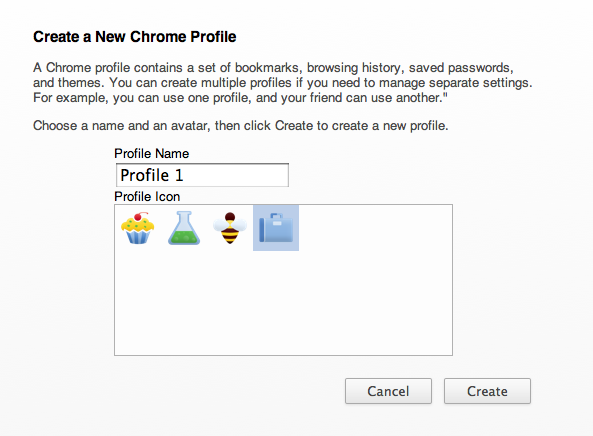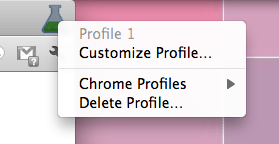The meteoric rise of Google’s Chrome web browser has a side effect that I think a lot of people are missing. It gives Google, which wants to continue to be the center of the web in the face of a huge challenge by Facebook, the ultimate weapon. And while Google will never admit this, they don’t have to. We’re already seeing it.
The latest builds of Chrome (version 14 in the Canary channel) feature a new, experimental profile switching and creation icon. This ability to tie a Google account to Chrome has been around for a little while, and it’s a vital part of Chrome OS, but given the new graphical layout of the feature, it’s clear that Google intends to make this much more useful and compelling.
In the upper right hand side of Chrome’s outer chrome (heh), you’ll see a beaker icon that Google likes to use for experimental features. Clicking on this allows you to see your Chrome Profile, customize it, switch to another one, or delete it. The customization is still rudimentary — you can set your sync options (which is again, old) or you can create a new profile. When you go to create a new profile, you’re taken to a page that allows you to set a profile name and pick a profile icon — it’s similar to Chrome OS. The text on the creator reads:
“A Chrome profile contains a set of bookmarks, browsing history, saved passwords, and themes. You can create multiple profiles if you need to manage separate settings. For example, you can use one profile, and your friend can use another.”
That all sounds simple and great. But again, don’t overlook the underlying power here. Google has granted Chrome the ability to offer all Google users a fully logged-in experience as they browse the web. Right now, they’re doing the basics, but down the line, they could easily flip the switch on more powerful features. Perhaps Chrome will gain full Google+ integration (a toolbar across Google sites? Please. How about one across the entire web!)? Or how about a Google single sign-on? Or how about a deeply integrated ad network?
Again, Google will deny all of these intentions because I’m sort of making them sound nefarious. But the truth is that they’re just smart moves (though anti-trust regulators will undoubtedly disagree if Chrome becomes large enough). And Google would be foolish not to pursue them.
Facebook is Google’s biggest challenge on the web, and Chrome gives them something that Facebook does not have: a browser. Now, Facebook is undoubtedly working on one (I have no real info here beyond common sense — it would be insane if they weren’t working on one) and they’ve already been doing some partnerships in the space. With Connect, Facebook has been all about offering up a logged-in Facebook experience across the web. But Connect is tricky. Site owners need to implement it. What if a user could do simply in their own browser?
That’s Google’s golden opportunity with Chrome. And the baby steps are being taken.
































Comment